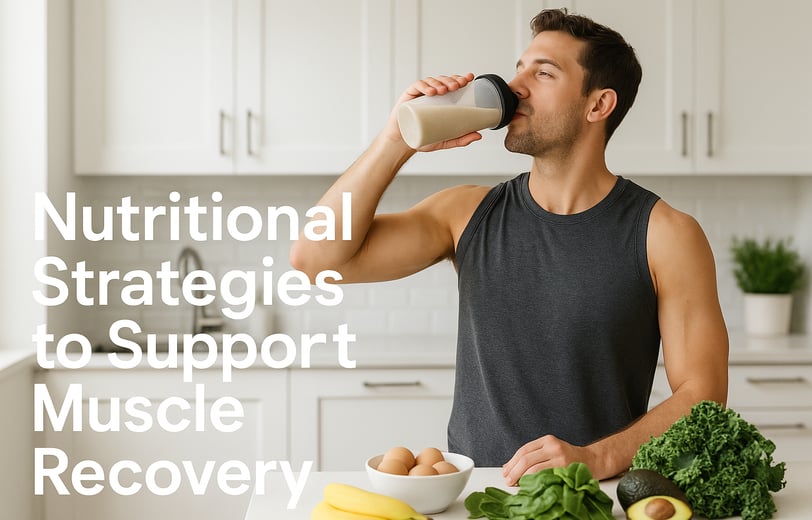Nutritional Strategies That Actually Boost Muscle Recovery
Fuel your gains the right way. Learn science-backed nutrition tips for faster muscle recovery, reduced soreness, and stronger results — plus key products that make recovery effortless.
5/31/20253 min read


Nutritional Strategies to Support Muscle Recovery
Your workouts don’t make you stronger — your recovery does. And at the heart of that recovery process is nutrition. What you feed your body after training plays a direct role in how efficiently your muscles rebuild, how much soreness you experience, and whether you show up stronger next time or fall behind.
Muscle recovery is more than just protein shakes and sleep. It’s a coordinated system of cellular repair, inflammation reduction, and nutrient signaling — all of which you can influence with the right dietary strategies.
1. Eat Enough — Not Just Protein
The most common recovery mistake? Undereating. Muscle recovery demands energy. If you're cutting calories too aggressively or skipping meals after training, your body won't have what it needs to rebuild.
Yes, protein is crucial — but so are carbohydrates (to replenish glycogen), fats (to support hormones and reduce inflammation), and micronutrients like magnesium, zinc, and B vitamins.
Athletes should aim for 1.6–2.2 grams of protein per kilogram of body weight per day, according to research published in the Journal of the International Society of Sports Nutrition. But even more important? Timing — prioritize getting a balanced meal within 60–90 minutes after exercise.
Product we recommend: Optimum Nutrition Gold Standard Whey
What it is: A clean, trusted whey protein with 24g of protein per scoop Amazon.
Why it works: It gives your body the essential amino acids needed for muscle repair immediately after training.
Best for: Post-workout shakes when you’re short on time.
Add a scoop to your favorite smoothie or mix it with water/milk to support recovery in minutes.
2. Use BCAAs and EAAs Strategically
While whole protein sources should always be your foundation, branched-chain amino acids (BCAAs) and essential amino acids (EAAs) can be useful when training fasted, during long sessions, or when you’re not hitting your daily protein goals.
Leucine, in particular, acts as a switch that triggers muscle protein synthesis — your body’s internal “rebuild” process. Research shows BCAAs can reduce muscle soreness and even delay fatigue during endurance sessions.
Product we recommend: Xtend BCAA – Watermelon Explosion
What it is: A refreshing intra- or post-workout BCAA formula with electrolytes Amazon.
Why it works: Supports recovery while also helping you stay hydrated.
Best for: Sipping during long or intense sessions to reduce next-day soreness.
Keep it in your gym bag for training days when you're going hard.
3. Prioritize Anti-Inflammatory Nutrients
Recovery isn’t just about rebuilding — it’s also about reducing chronic inflammation so your body can focus on healing.
Foods rich in omega-3s, polyphenols, and collagen peptides can help manage inflammation in joints and soft tissue. Berries, turmeric, wild-caught fish, and leafy greens are all great anti-inflammatory staples. Collagen in particular has been shown to support connective tissue repair, especially when paired with vitamin C.
Product we recommend: Vital Proteins Collagen Peptides
What it is: A blend of Type I & III collagen from pasture-raised bovine Amazon.
Why it works: Helps support joint, tendon, and muscle tissue health after repeated stress.
Best for: Adding to coffee, tea, or smoothies to recover beyond just your muscles.
Make it a part of your morning routine to support full-body resilience.
4. Don’t Forget Hydration & Electrolytes
Water alone isn’t enough. When you sweat, you lose sodium, potassium, and magnesium — all essential for cellular function and muscle recovery. If you’re not replenishing those electrolytes, you may experience cramping, fatigue, or slower recovery times.
A great post-workout recovery meal or shake should contain a mix of fluids, salt (yes, salt), and ideally a full-spectrum electrolyte blend if you’re training in the heat or doing long-duration sessions.
5. Build a Recovery Routine, Not a One-Off
Recovery isn’t a one-time fix — it’s a daily process. A consistent, nutrition-first approach that supports your body before, during, and after training is how you get results.
That means building habits like:
Having a go-to post-workout meal or shake.
Prepping high-protein snacks ahead of time.
Drinking electrolytes after every intense session.
Using collagen or omega-3s daily, not just when you feel sore.
You don’t need dozens of supplements — just the right few that align with your training and lifestyle.
Final Take
You train hard. Now recover smart. Nutrition is your secret weapon when it comes to bouncing back from tough workouts, reducing injury risk, and continuing to make gains without burnout.
Focus on total food intake, prioritize complete protein, support your joints and tissues, and hydrate intelligently. When your nutrition is aligned with your effort, the results speak for themselves.
Consistency is king — and a solid recovery game makes it sustainable.
FITNESS
Nutrition
WellnesS
info@movebetterco.com
© 2025. All rights reserved | Privacy Policy | Terms & Conditions